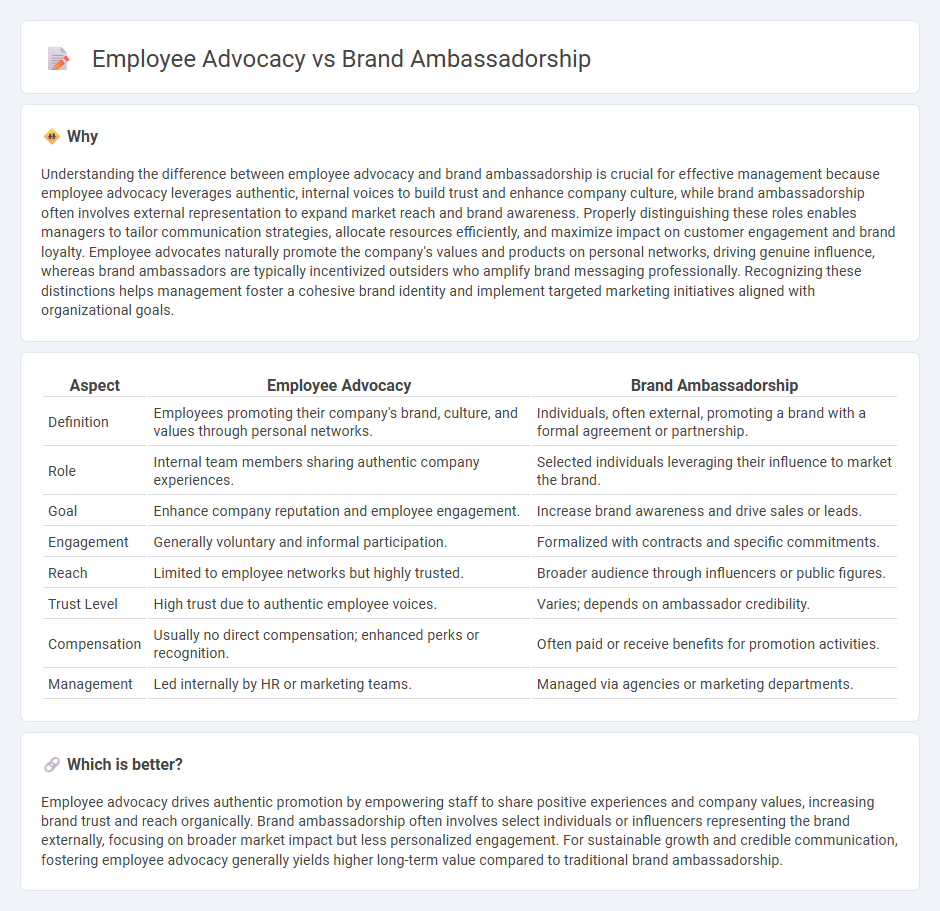
Employee advocacy leverages staff members to authentically share and promote company values, fostering trust and organic growth through personal networks. Brand ambassadorship involves individuals who consistently represent and elevate a company's image, often with a formal or paid relationship, enhancing brand visibility. Explore deeper insights into how these strategies uniquely benefit business management efforts.
Why it is important
Understanding the difference between employee advocacy and brand ambassadorship is crucial for effective management because employee advocacy leverages authentic, internal voices to build trust and enhance company culture, while brand ambassadorship often involves external representation to expand market reach and brand awareness. Properly distinguishing these roles enables managers to tailor communication strategies, allocate resources efficiently, and maximize impact on customer engagement and brand loyalty. Employee advocates naturally promote the company's values and products on personal networks, driving genuine influence, whereas brand ambassadors are typically incentivized outsiders who amplify brand messaging professionally. Recognizing these distinctions helps management foster a cohesive brand identity and implement targeted marketing initiatives aligned with organizational goals.
Comparison Table
| Aspect | Employee Advocacy | Brand Ambassadorship |
|---|---|---|
| Definition | Employees promoting their company's brand, culture, and values through personal networks. | Individuals, often external, promoting a brand with a formal agreement or partnership. |
| Role | Internal team members sharing authentic company experiences. | Selected individuals leveraging their influence to market the brand. |
| Goal | Enhance company reputation and employee engagement. | Increase brand awareness and drive sales or leads. |
| Engagement | Generally voluntary and informal participation. | Formalized with contracts and specific commitments. |
| Reach | Limited to employee networks but highly trusted. | Broader audience through influencers or public figures. |
| Trust Level | High trust due to authentic employee voices. | Varies; depends on ambassador credibility. |
| Compensation | Usually no direct compensation; enhanced perks or recognition. | Often paid or receive benefits for promotion activities. |
| Management | Led internally by HR or marketing teams. | Managed via agencies or marketing departments. |
Which is better?
Employee advocacy drives authentic promotion by empowering staff to share positive experiences and company values, increasing brand trust and reach organically. Brand ambassadorship often involves select individuals or influencers representing the brand externally, focusing on broader market impact but less personalized engagement. For sustainable growth and credible communication, fostering employee advocacy generally yields higher long-term value compared to traditional brand ambassadorship.
Connection
Employee advocacy and brand ambassadorship are interconnected through employees actively promoting a company's values, products, and culture both online and offline. Empowering employees to share authentic experiences enhances brand credibility, amplifies marketing reach, and builds trust with potential customers. This alignment fosters a strong internal culture, driving higher engagement, retention, and positive brand perception.
Key Terms
Representation
Brand ambassadorship emphasizes external representation where individuals actively promote a company's products or values to a wider audience. Employee advocacy centers on internal representation, empowering staff to authentically share positive work experiences and company culture through their own social networks. Explore the distinct advantages of each approach to enhance your marketing strategy.
Engagement
Brand ambassadorship leverages passionate individuals who actively promote a company's products or values, resulting in authentic and high-impact engagement. Employee advocacy harnesses the voice of internal staff to amplify brand messages, fostering trust and enhancing reach within professional networks. Explore how these strategies uniquely boost engagement and drive brand loyalty.
Authenticity
Brand ambassadorship leverages trusted individuals who genuinely resonate with a brand's values to create authentic connections with target audiences. Employee advocacy emphasizes empowering internal staff to share their real experiences and insights, enhancing credibility and fostering organic trust. Explore how harnessing authentic voices can amplify your brand's impact.
Source and External Links
How To Become a Brand Ambassador in 7 Steps - This guide provides a step-by-step approach to becoming a brand ambassador, focusing on discovering compatible brands and building engagement.
Brand Ambassador: Meaning, Profiles and Examples - Explains the role of a brand ambassador as someone who promotes a brand on a long-term basis, embodying its values and often having first-hand experience with the products.
How To Become a Brand Ambassador in 8 Steps - Offers an eight-step process to becoming a brand ambassador, emphasizing the importance of networking and growing an online community.
 dowidth.com
dowidth.com